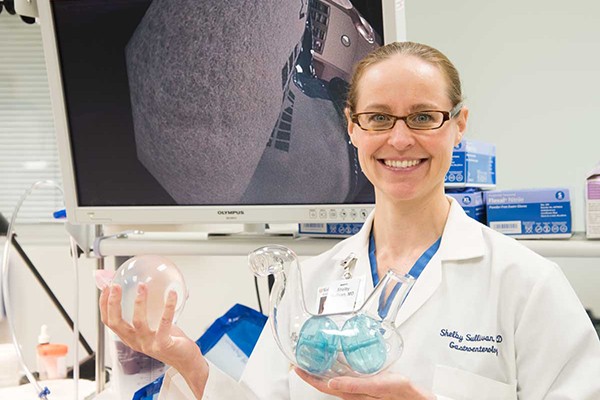New for weight loss: balloon therapy
Washington University School of Medicine in St. Louis and Barnes-Jewish West County Hospital are offering a newly approved, nonsurgical therapy to help people lose weight. Shelby Sullivan, MD, holding models of the two systems being used, said the therapy involves placing special balloons into the stomach and inflating them to give patients the feeling of being full after eating small meals.
Growing human GI cells may lead to personalized treatments
A method of growing human cells from tissue removed from a patient’s gastrointestinal (GI) tract eventually may help scientists develop tailor-made therapies for inflammatory bowel disease and other GI conditions. Pictured are Kelli L. VanDussen, PhD, and Matthew A. Ciorba, MD, members of a School of Medicine team that developed the method.
Incisionless surgery corrects swallowing disorder
By passing surgical instruments through a patient’s mouth, School of Medicine doctors have corrected a problem that prevented a woman from easily swallowing food and liquids. The operation is one of the first of its kind in the region performed through a natural opening in the body rather than an incision. Pictured is the surgical knife (blue) in the esophagus.
Poor colonoscopy prep hides pre-cancerous polyps
What happens on the day before a colonoscopy may be just as important as the colon-screening test itself. Gastroenterologists at Washington University School of Medicine in St. Louis have found that when patients don’t adequately prep for the test by cleansing their colons, doctors often can’t see potentially dangerous pre-cancerous lesions.
Probiotic protects intestine from radiation injury
Scientists at Washington University School of Medicine in St. Louis have shown that taking a probiotic before radiation therapy can protect the intestine from damage — at least in mice. Their study suggests that taking a probiotic also may help cancer patients avoid intestinal injury, a common problem in those receiving radiation therapy for abdominal cancers.
Colitis patients diagnosed later in life tend to have better disease outcomes
Adults diagnosed with ulcerative colitis after age 50 are more likely to achieve remission from their symptoms than patients diagnosed at younger ages, even when those patients receive similar treatments, according to research at Washington University School of Medicine in St. Louis. The study is the first to look at patients whose colitis was treated with modern medications. Nearly 1 million U.S. adults have ulcerative colitis.

